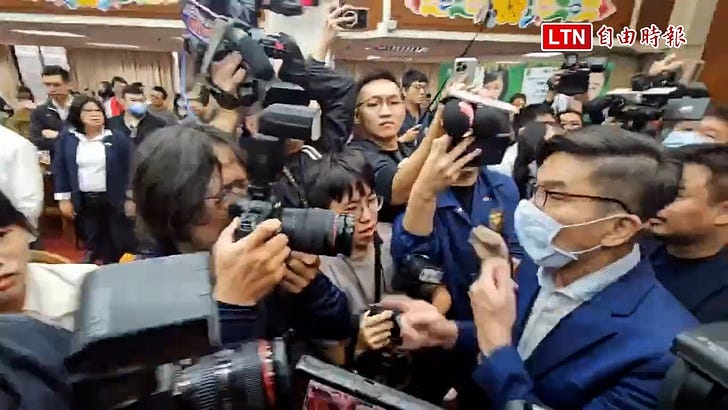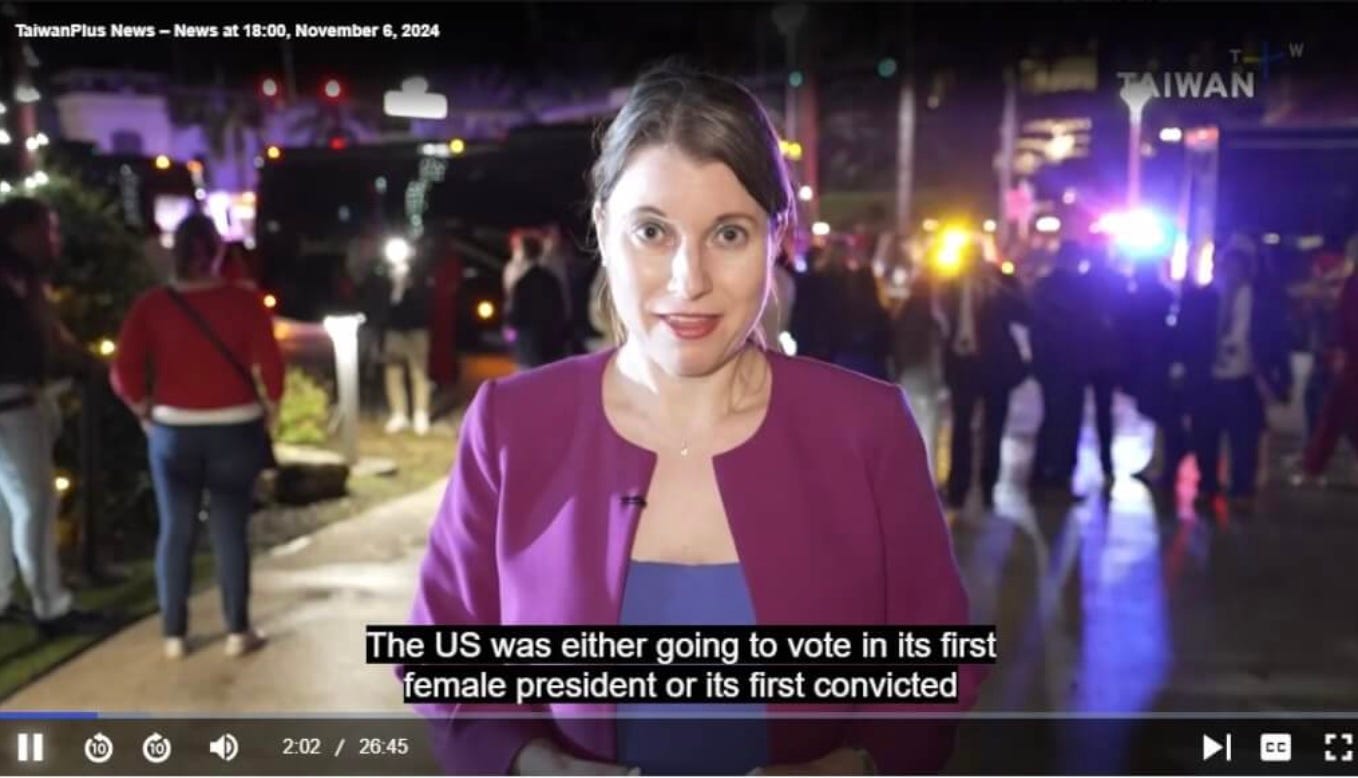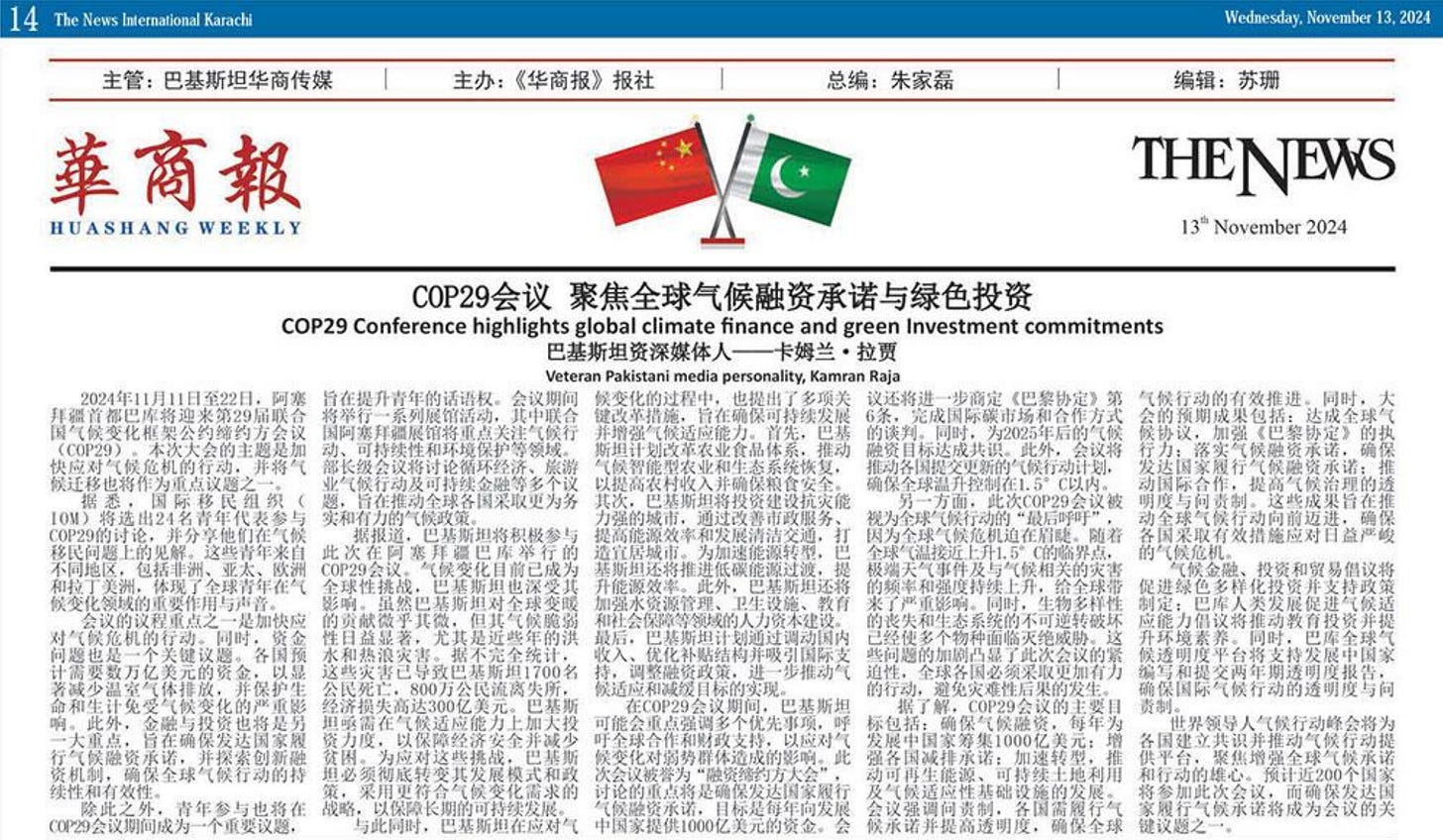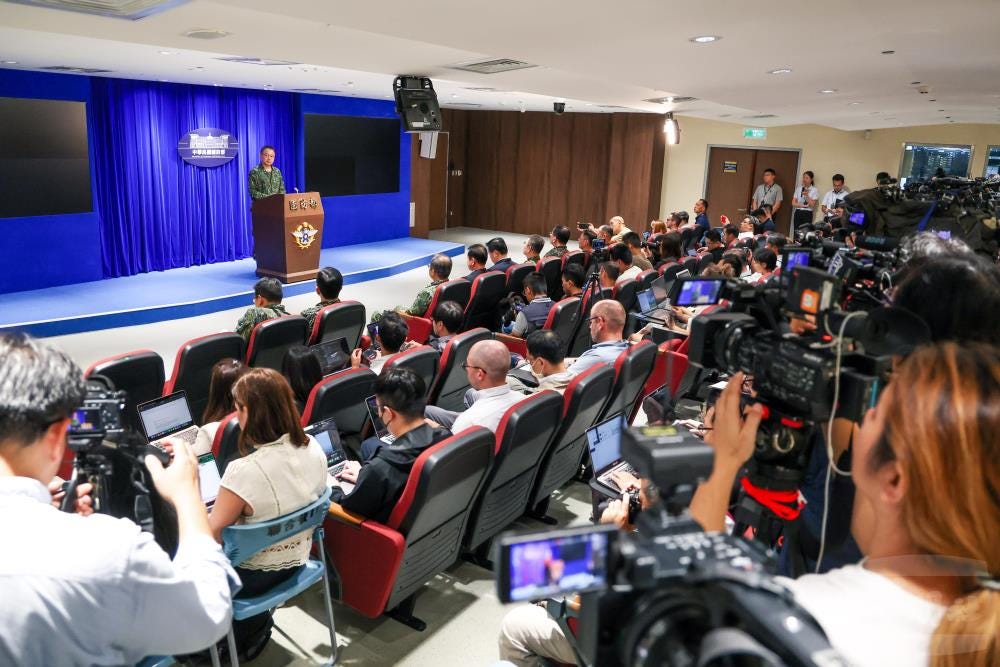Lingua Sinica Newsletter, 21 November
News, analysis, and commentary on Chinese-language media from the PRC and beyond.
Welcome back to Lingua Sinica.
This week in the news has been an uncomfortably personal one for me. Not only is this because of the heart-wrenching decision by a Hong Kong court to sentence 45 democrats to jail — some for over ten years — simply for trying to win local elections and make the government account for popular sentiment. It’s also because here in Taiwan, the country’s celebrated freedom of the press has been shaken by an incident of censorship at an outlet whose weaknesses and pressure points I’m all too familiar with. I hope you’ll tolerate this unusually long letter as I offer a few reflections. Remember, there is a lot of great content down below these thoughts.
It’s not often we get to cover cases of suspected government intervention in the media of Taiwan, a country that rightly regards itself as a bastion for the free press in the Chinese-speaking world. But a recent and ongoing scandal at a Taiwanese broadcaster over its coverage of the US presidential race has sparked condemnation and concern from a wide array of actors, ranging from elected officials and domestic news outlets to even international media advocacy groups.
The furor began with some surprisingly uncontroversial remarks from a reporter in the field for TaiwanPlus, an English-language video platform launched in 2021 to bring Taiwanese stories and perspectives to international audiences. Recording a piece-to-camera on election day, the reporter, Louise Watt, posed the question of whether American voters would elect their first female president or their first leader who was a “convicted felon.” Trump’s convictions are a matter of public record and an objective fact, but a lawmaker with the opposition Kuomintang (KMT) seized upon this as an example of political bias at the station, which has been a focus of political contention. In what seemed a thoughtless, knee-jerk reaction to pressure, TaiwanPlus reacted by removing the report without explanation, then later re-uploaded a version with the remarks removed — again without explanation. Its parent organization, the Public Television Service or PTS, says it has launched an internal investigation into the matter. Taiwan’s Foreign Correspondents’ Club and Reporters Without Borders have expressed concern about what looks to many like a case of official censorship of the media over concerns it could prick the ego of the US president-elect and jeopardize the nation’s most important partnership.
Another fact about TaiwanPlus is that it also happens to be my former employer. As I can attest, the project has, since its earliest days, been beset by internal chaos and political rivalries. The outlet as it exists today bears little resemblance to the vision I was sold on what its first CEO — who later walked away — brought me on board. Since day one, parts of the KMT have had it in for TaiwanPlus, seen as a pet project of former President Tsai Ing-wen, whose Democratic Progressive Party has been active in founding new public media to serve the Indigenous population, Hakka communications, and now international audiences. Appeasing objections about Taiwanese taxpayer dollars going to something Taiwanese wouldn’t see meant that instead of the digital-first outfit I was promised, we were now working for terrestrial TV, translating perplexingly local news stories from other local stations into English for an audience no one could identify.
Day-to-day, the newsroom enjoyed editorial independence, but the guardrails around this were more of a “gentleman’s agreement” than a binding charter like that enjoyed by the BBC. We were regularly read “feedback” on our content from a focus group of senior officials — a bizarre ritual, to be sure, although we were assured that we were under no obligation to alter our coverage so as to solicit more positive feedback. This exercise increased as TaiwanPlus moved from the auspices of the official news agency CNA — which, having never worked in video news, took a more hands-off approach — and came under PTS management. Ditto when our initial news director, a foreign journalist with extensive international media experience, was replaced by a Taiwanese journalist more attuned to local demands — another bizarre situation for a broadcaster that was meant to appeal to viewers abroad. All this is to say that TaiwanPlus was never quite what it appeared, or how it liked to see itself. And this latest controversy now has many more people from the outside asking the same questions staff had long been asking themselves: is TaiwanPlus a public broadcaster like the BBC or CBC, editorially independent and accountable to the public, or is it merely a soft-pedaling vehicle for prevailing government sensibilities?
The answer is, for now, a bit of both. Due primarily to the dismally low wages in Taiwan and its media industry especially, few experienced reporters like Watt remain on staff, but they continue to try to produce meaningful journalism within the parameters they have every day. I would never compare any of them to the propagandists or state stenographers that populate the PRC state media outlets we are so familiar with. It’s also understandable for Taiwanese to be on edge about the outcome of the US election and to want to tread very carefully around its volatile president-elect, but TaiwanPlus still needs to resolve the identity crisis that has shadowed it since before it even launched: is it an independent, international news source or an extension of Taiwanese politics?
For its part, Taiwan itself also needs to answer an even bigger question: are its commitment to freedom and its friendship with the US not strong enough to survive facts-based journalism and the occasional snipe from a member of the country's political opposition? We’ll continue watching the fallout from this case, hoping to find out.
Ryan Ho Kilpatrick
CMP Managing Editor
IN THE NEWS
What Am I to You?
Media in Taiwan and China ask what lies ahead under Trump 2.0
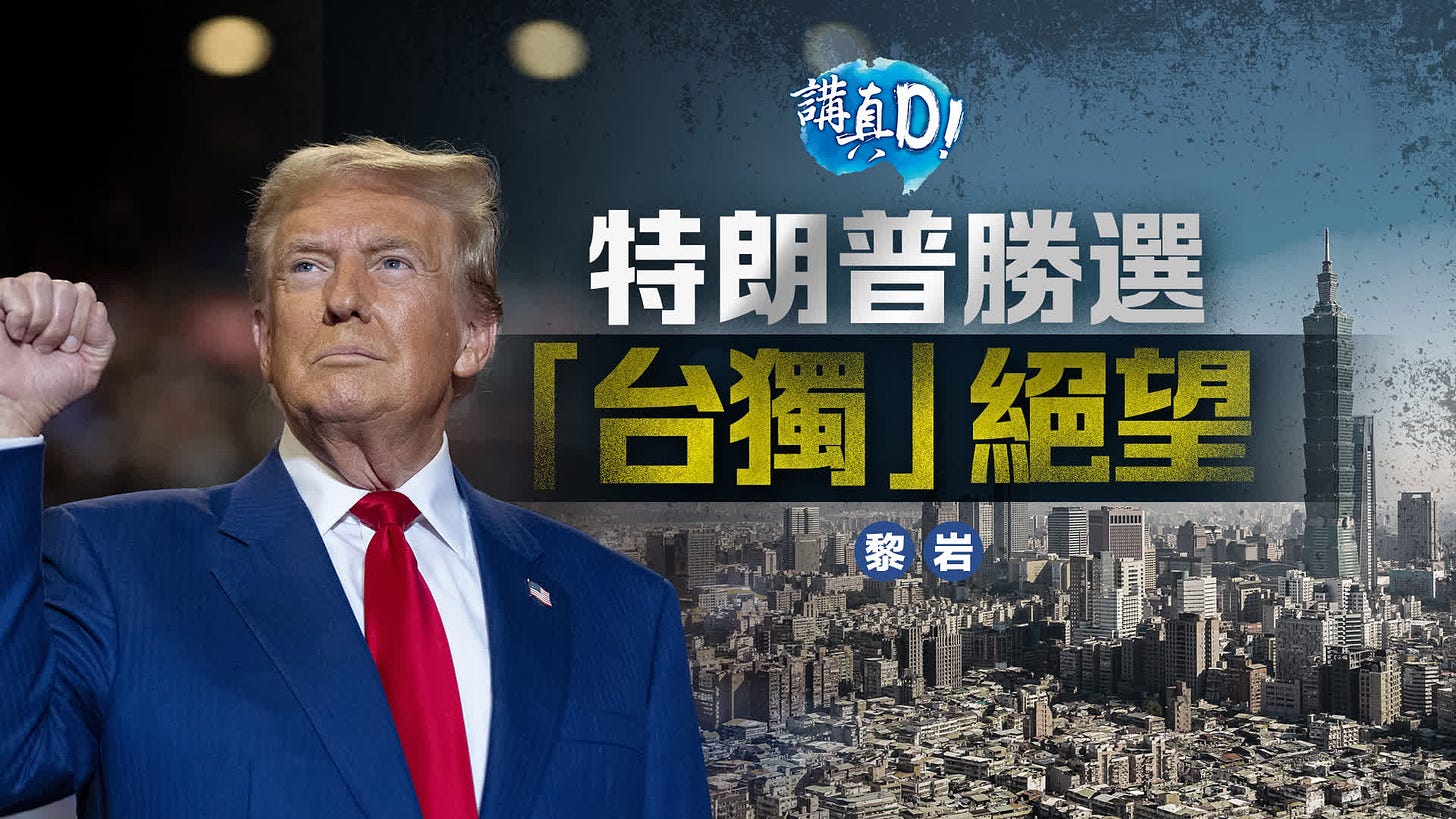
The United States is Taiwan’s most important ally, and the recent reelection of Donald Trump has left many around the country wondering how this will affect the embattled democracy and how they should handle a second, potentially volatile Trump presidency. The urgency and weight of this question were underscored by the national scandal around broadcaster TaiwanPlus’s reporting of Trump’s criminal convictions — an issue I explore in depth in my letter above.
In Hong Kong, state-run sister newspapers the Ta Kung Pao (大公報) and Wen Wei Po (文匯報) reacted with barely-concealed glee about the negative consequences Trump’s victory would have for Taipei. The former predicted that Taiwan would become “meat on the chopping block” for Trump’s administration, implying that he would bleed it dry in exchange for US security guarantees. It’s a dramatic spin but one based on Trump’s own words: in an interview with Bloomberg earlier this year, he said Taiwan “should pay” for US military assistance. The Ta Kung Wen Wei website went with a less corporeal metaphor, calling Taiwan a geopolitical “chess piece” (棋子) that would soon become America’s “abandoned son” (棄子) — homophones in Mandarin.
Taiwan’s United Daily News (聯合報), a “pan-blue” newspaper that typically supports the more China-friendly Kuomintang and opposes the ruling Democratic Progressive Party (DPP), echoed concerns about Taiwan “becoming a pawn” for Trump. Taiwan’s situation, they acknowledge, is precarious, calling particular attention to Trump’s recent claim that Taiwan “stole” America’s chip industry. As usual, though, domestic politics come first for Taiwan’s partisan media. UDN blames neither the erratic US president-elect nor China’s increasingly aggressive leadership for this predicament, but rather President Lai Ching-te of the DPP.
“The problem,” they conclude, “is that Lai has always been a yes-man [for the US]. How can such a weak government protect Taiwan and its sacred mountain [TSMC]?”
NEWSMAKERS
Cheng v. Jones
Hong Kong Journalists Association chairperson Selina Cheng is suing her former employer, the Wall Street Journal, over wrongful termination after the US newspaper fired her over her role at the press union — a voice for press freedom in the territory.
Cheng brought her case to Hong Kong’s Labour Department and submitted evidence last week, saying mediation with her former employer proved “ineffective.” On her claim form, Cheng stated that she was laid off unreasonably and unlawfully in mid-July because of her participation in a trade union, constituting a violation of local labor law.
For more on the background to Cheng’s case, the deterioration of press freedom in Hong Kong, and how foreign news outlets have allegedly been complicit in that process, read my piece “Code of Silence” from July. As I reported then, it has been an open secret in Hong Kong that employers have been threatening their local employees with termination if they participate in groups like the HKJA that advocate for press freedom. Sources say that even international media like the Journal that pay lip service to the free press elsewhere are guilty of this.
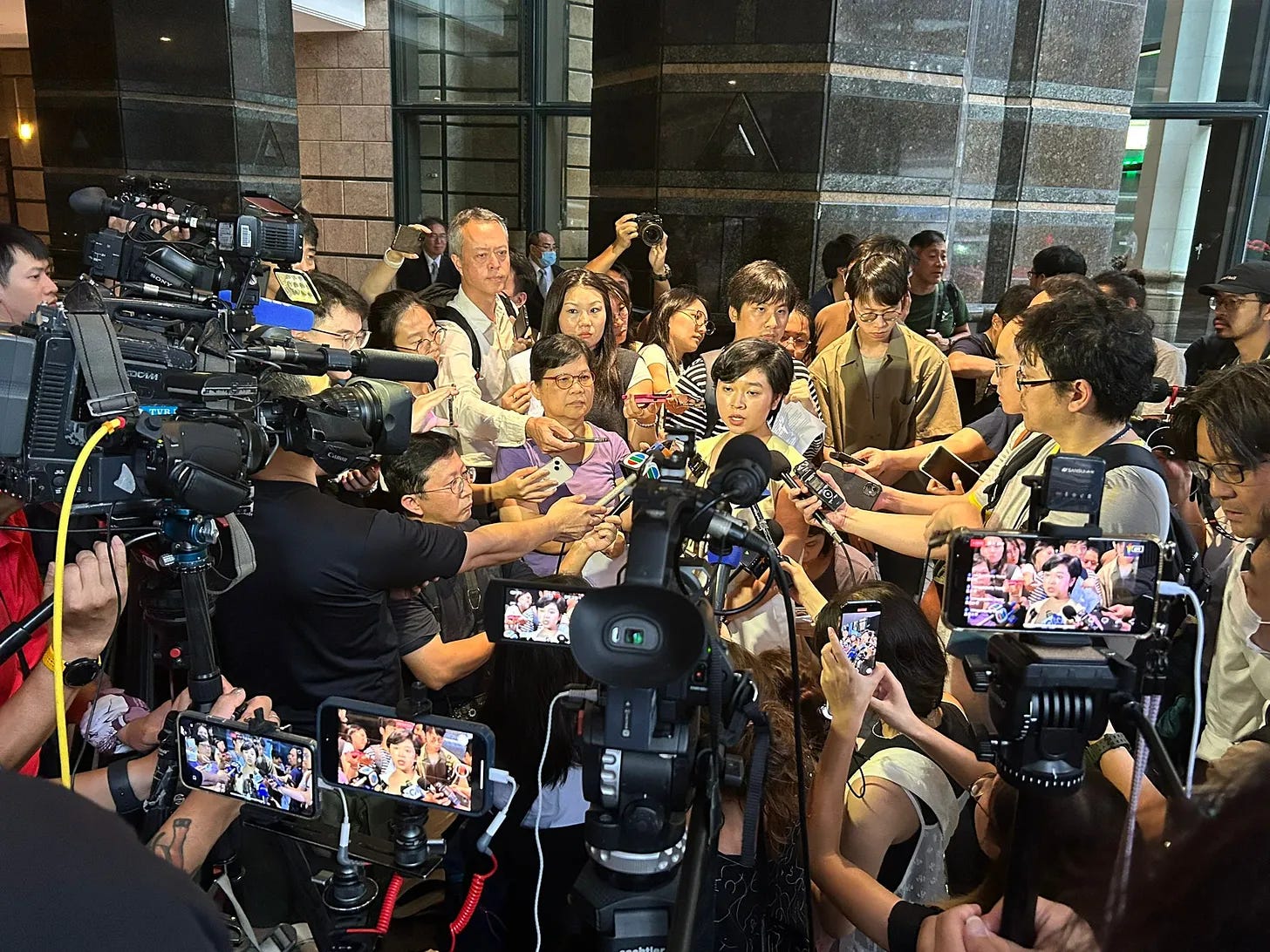
No News is Bad News
Former Global Times editor Hu Xijin (胡锡进) is not exactly known for keeping his opinions to himself. For years, his Weibo account has been filled with op-eds, giving his views — or, some reckon, the CCP’s — on the news of the day. Since his return to social media after a three-month-long absence, however, his posts have been uncharacteristically circumspect.
Take two violent tragedies that have rocked China in the past week. When a driver killed 35 pedestrians in Zhuhai and a knifeman killed eight in Wuxi, Hu simply reposted the official Xinhua news bulletins relaying basic facts surrounding the attacks, adding nothing but a few vintage microphone emojis. The old Hu couldn’t have resisted putting in his two cents.
The two non-posts are reminders of a growing trend that we have observed throughout the Chinese media space. Whereas state media once hustled to be “first on the scene” and control the narrative through the immediacy of their reporting — the original Hu Jintao notion of “public opinion channeling,” also known as “grabbing the megaphone” — even the biggest breaking news stories these days are covered via reposted official notices from the police and other government agencies, with no original reporting or commentary added. This was also the case recently in the aftermath of the stabbing of a Japanese schoolboy in Shenzhen. News sources copied verbatim the Ministry of Foreign Affairs remarks on the topic, adding no extra content. Journalists like Hu act as little more than microphones themselves, amplifying the official line.
TRACKING CONTROL
Li Ziqi’s Convenient Return
Hu Xijin isn’t the only Chinese influencer to have made a return recently. Outside China-watching circles, pastoral vlogger Li Ziqi (李子柒) is a much bigger name — and her absence has been much longer and more pronounced. Her 78 million followers across YouTube and Douyin have been waiting three years for her to upload again. Despite becoming a worldwide sensation during the Covid-19 pandemic, when her calming, idyllic visions of countryside life were a salve for the countless people confined to their homes, Li suddenly stopped posting in 2021. This was also when she filed a lawsuit against the streaming company she had partnered with.
Li finally made an appearance again on November 12. In an interview the following day with Xinhua, she told the state news agency, rather cryptically, that she had just been “sleeping” the past three years. The interview did not mention the dispute or whether it was ever resolved. Her return may not have been well explained but was well-timed, coming hot on the heels of a Politburo study session in which Xi Jinping said that China needs to pass on its heritage through “creative transformation and innovative development,” merging culture with the latest tech. Li echoes this in her Xinhua interview, reiterating several times her work focuses on “the innovative development of traditional culture” — a formula now christened the Two Creates.
Li has long been a role model for state media on how to “tell China’s story well” (讲好中国故事). Her unique take on traditional Chinese culture and her success at winning over foreign audiences have been praised by the Global Times, People’s Daily, CCTV, and PLA Daily. The lattermost even wrote about how they could emulate her style to “better spread military news.” As well as giving her comeback interview to Xinhua, it’s noteworthy that Li earlier announced her return on Xuexi Qiangguo (学习强国), an app created by the Central Propaganda Department to spread Xi Jinping’s political thought. Meanwhile, People’s Daily posted a music video of her on Bilibili, interwoven with shots of taikonauts, infrastructure megaprojects, and PLA missile launchers, her return-to-tradition aesthetic linked to all the modern trappings of China’s “Great Rejuvenation.” The Party, of course, was far from alone in wanting to see Li harvesting rice and weaving cloth again — but they clearly had their own reasons.
CHAIN REACTIONS
News Among “Iron Brothers”
Established in 2016, Huashang Weekly (华商报) is the only bilingual Chinese-English weekly approved for circulation in Pakistan. As its name suggests, the publication is aimed at Chinese businesspeople and other PRC expatriates based in the country — a long-term PRC ally often referred to as China’s “iron brother.”
Huashang Weekly distributes around 10,000 copies each week to Karachi, Lahore, and Islamabad. In 2017, they forged a “strategic partnership” with Pakistan’s Jang Group of Newspapers, providing a weekly 1-2 page supplement in Chinese for their English-language daily The News, which boasts a wider circulation of 200,000 copies daily.
But the outlet also serves as a convenient vehicle for China's state messaging, thanks to a close partnership with one of the country's top news agencies. To learn more about Huashang Weekly, stay tuned for our latest Media in Focus column, hitting your inboxes tomorrow — if you are a Lingua Sinica subscriber.
TIAN JIAN
Why do the Golden Horses Matter?
A selection from CMP’s Chinese-language outlet on journalism and media in the global Sinophone space. Become a free subscriber now.
Hailed as the “Oscars of Asia,” Taiwan’s Golden Horse Film Awards (金馬獎) are a big night for filmmakers and movie buffs all across the Chinese-speaking world. This year’s award ceremony is coming up on November 23, so our sister publication Tian Jian (田間) asked experts on the industry from China, Taiwan, and Malaysia why these awards from the 1960s are not only still relevant but in fact more important than they’ve ever been. Read the full piece in Chinese here.
Film critic Jia Xuanning (賈選凝)
The Golden Horse Film Awards fan outwards to the whole Chinese-speaking world in a way no others do. Other film awards tend to be much more local or inward-looking in orientation, but the Golden Horses have a strong effect of radiating outwards while also being very inclusive, attracting a lot of different works from various regions.
Underground filmmaker and critic Wang Zupeng (王祖鵬)
It comes down to two things: freedom and visibility.
Let’s talk about freedom first. Nominees for Best Director this year include Above the Dust (沃土) director Wang Xiaoshuai (王小帥), Three Castrated Goats (三個羯子) director Ye Xingyu (葉星宇), and An Unfinished Film (一部未完成的作品) director Lou Ye (婁燁). All of these films are banned in China. You can’t separate film from politics, but the Golden Horse awards have shown time and again that they will not reject any work based on politics. Instead, they only consider artistic merit. This comes at a time when censorship and restrictions are only increasing in China — and now, by extension, Hong Kong.
Then there’s visibility. The film industries in Singapore and Malaysia aren’t as well developed as they are in China, Hong Kong, and Taiwan. By comparison, they don’t have awards as high-profile as the Golden Horses. The Golden Horses act as a marker of quality for the international film industry and audiences alike. Getting nominated for an award confers prestige and that can help creators to develop their careers. Winning a Golden Horse helped the Malaysian filmmaker Chong Keat Aun (張吉安) take his career international, for example.
Film critic Wonder Wong (翁煌德)
The Golden Horses are an opportunity for Chinese-language films from other regions to be seen. There are two phenomena we’ve observed in recent years. The first is that films from Southeast Asia have become more prominent, and the second is that we’re seeing more independent Chinese films that aren’t, strictly speaking, from China. Even though they might be filmed in China by Chinese directors they’re produced elsewhere, yet it’s difficult to say they’re actually from anywhere else.There’s one special case this year as well: the Nepalese film Shambhala (香巴拉), which was filmed in Tibetan. How to define “Chinese language films” could be a challenge for the Golden Horse awards in the future.
It’s true that films from Southeast Asia are now being seen more. The Golden Horses can offer encouragement to filmmakers there and an incentive to create. Over the past few years, we have actually begun to realize that there is still a lot of potential in the development of Chinese-language films in these regions. Beginning in 2019, it has become more difficult for productions from China and Hong Kong to apply for the Golden Horse awards, and Taiwanese filmmakers now have closer ties and cooperation with Southeast Asian filmmakers instead.
Film critic Charles Kuay (郭朝河)
To Malaysian Chinese, the Golden Horses are traditionally seen as secondary to the Hong Kong Film Awards (香港金像獎). Even though the Golden Horses are older, Hong Kong was seen as the “Hollywood of the East” throughout the Chinese-speaking world in the 1980s and 90s. Malaysia was heavily influenced by Hong Kong Cantonese culture and the Golden Horses were seen as politically charged and not nearly as important as the Hong Kong Film Awards.
It wasn’t until the decline of Hong Kong cinema and the rise of Taiwanese and Chinese films in the 2000s that we saw the advantages of the Golden Horses, particularly in their wider geographic scope and the relatively transparent judging mechanism. As a result, more Malaysian Chinese began paying attention to the Golden Horses. Meanwhile, the scale of the Malaysian Chinese film industry has gradually grown over the past ten years, with many Malaysian films earning honors. For this reason, the awards have also become a symbol of Malaysia’s increasing cultural recognition and pride in our homegrown talents.
FLASHPOINTS
A Tale of Two Press Systems
Separate and unequal cases this month, both centering on the identical phrase “right to report” (採訪權), underscored sharply differing views on the role of journalism in China and Taiwan.
Case One: constitutional rights asserted by citizens and media
On November 6, the Finance Committee of Taiwan’s Legislative Yuan (立法院財政委員會) considered draft amendments to certain provisions of the country’s Income and Expenditure Division Act, aimed at increasing the share of government revenues going to local governments rather than to the central government. The issue has been highly contentious in Taiwan — vehemently opposed by the DPP but supported by the opposition KMT and the Taiwan People’s Party (TPT), which together maintain a slim majority in the Legislature and control over half of the country’s city and county-level governments.
As scuffles broke out among legislators inside the conference chamber, DPP legislator Chung Chia-pin (鍾佳濱), a former democracy activist, suddenly reached forward and grabbed the press badge hanging around the neck of a photographer from the China Times (中國時報), a "pan-blue" (pro-KMT) newspaper owned by the food and media conglomerate Want Want. The incident quickly ballooned into a controversy over interference in the right of the press to report. The Legislative Yuan Press Club (立法院記者聯誼會), an informal group comprising Taiwanese journalists covering legislative issues, condemned Chung's actions in trying to forcibly remove the photographer’s badge, which it said infringed on his right to interview (採訪權). The Association of Taiwan Journalists (台灣新聞記者協會) followed suit on November 8 with a statement protesting the “outrageous action by a political figure and calling on all sectors of the community to safeguard and respect the rights and autonomy of journalists granted to them by the Constitution.” Chung was roundly criticized in Taiwanese society, and the story was reported in a range of media outlets, both blue and green (and in-between).
Case Two: exclusive powers upheld by Party-controlled institutions
On November 14, Wang Wenzhi (王文志) and Cheng Zilong (程子龙), two reporters for Economic Information Daily (经济参考报) — a publication under the official state-run Xinhua News Agency — were attacked as they attempted a follow-up report on the use of substandard materials in a section of high-speed railway in Anhui province. The pair were reportedly set upon by thugs near a site managed by the China Railway Seventh Group (中铁七局) in Anhui, and Wang sustained an injury to his right hand. The attack followed a report by the journalists published on November 12 (“弹性垫层“一割就开), in which they revealed the use of substandard components in local railway construction, resulting in potentially serious safety issues. The attack itself was reported first by the Xiaoxiang Morning Herald (潇湘晨报), a commercial newspaper in Hunan province, and drew a wave of reports from other outlets. Wrote one outraged commenter on Weibo: “The right to conduct press supervision cannot be trampled on, and you cannot strike the public’s right to know!”
Tellingly, the response in China on this case came not, as in the Taiwan case, from journalists themselves, but rather from the All-China Journalists Association (ACJA), an official organization under the leadership of the Chinese Communist Party. The ACJA said in a statement that journalists’ “legitimate right to interview” (正当采访权) must be protected. The key distinction here comes in the not-so-subtle addition of “legitimate” — noting that the ACJA is also the organization in China tasked with licensing the work of journalists through the “press card” (记者证) system, and the conduct of training in the “Marxist View of Journalism.”
Press cards in China can only be obtained through licensed news outlets, a system of press discipline ensuring that the ruling CCP monopolizes information gathering at its source. Government authorities in China have repeatedly gone through pains to emphasize that the unlicensed gathering of information will not be tolerated. The sensitive question of the “right to interview” even bubbled to the surface almost 15 years ago during a Spring Festival skit by the famous comedian Zhao Benshan (赵本山), in which two characters purporting to be “online journalists” for the portal site Sohu.com arrived in the countryside to interview Zhao’s character, a classic country bumpkin. In fact, such an act would be highly illegal. An aggregation site and not strictly speaking a “news media” by China’s highly restrictive standards, Sohu is not allowed licensed reporters — and has, therefore, no “right to interview.”
QUOTE/UNQUOTE
No Wall is Unbreakable
This week, Intersections, our monthly bulletin dedicated to covering women’s issues and feminism in the Chinese-language media space, sat down with Mang Mang (莽莽), a Chinese diaspora media launched in 2022 amidst widespread social demonstrations in China. Below is an abridged excerpt from that conversation — read the whole thing here.
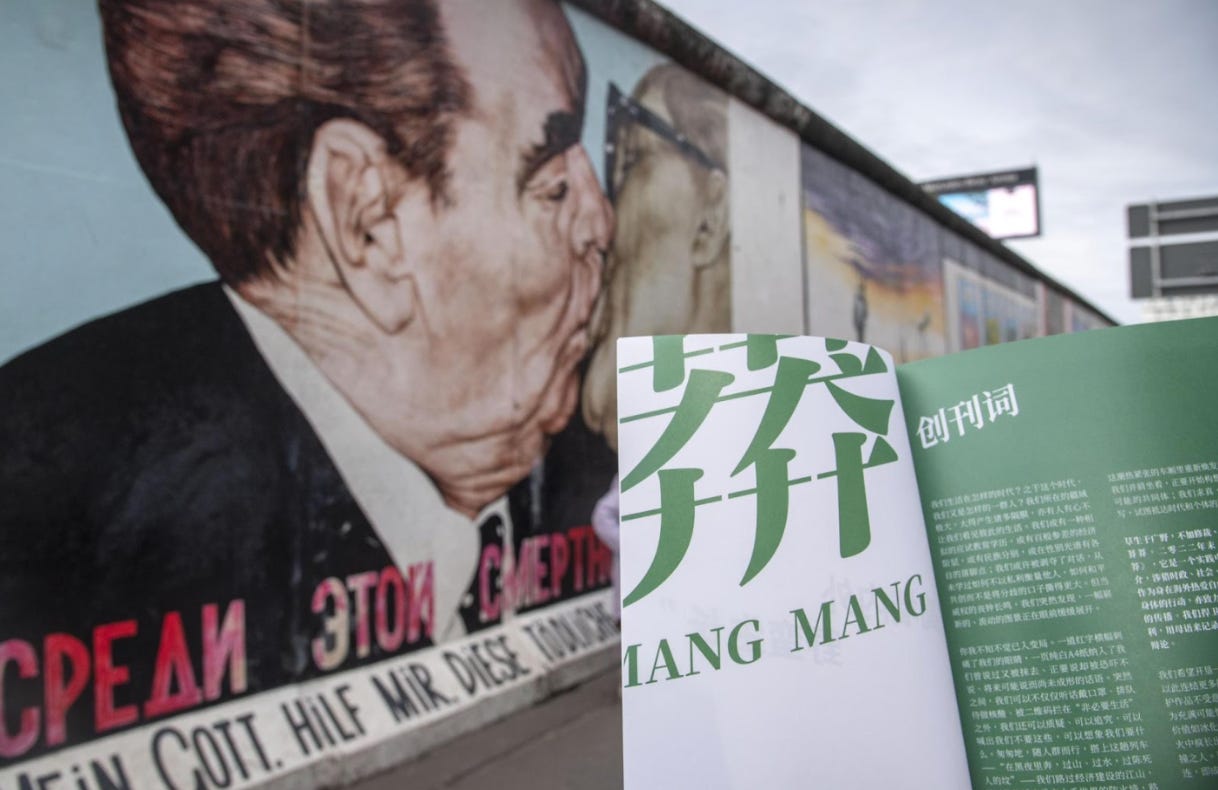
Intersections: Why do you think it's so important to tell women’s stories, and what inspired you to draw attention to their experiences?
Mang Mang: Mang Mang was launched to break through China's restrictive media environment and act on freedom of speech by reporting on and documenting a wide range of issues. These include China's social dynamics and public activism. The publication also pays attention to the activities of ethnic groups in Hong Kong, Taiwan, Tibet, and other regions, fostering connections and dialogues between Chinese activists and activists of other communities. The gender situation in China and women activists at home and abroad are key areas of focus for us at Mang Mang, as gender equality and diversity in China is something we want to promote.
This is true not just because we grew up in China’s harsh gender environment, but also because gender and feminist movements there have inspired and shaped our sense of public awareness and participation. At various moments, feminist performance art, different waves of the MeToo movement, incidents of gender-based violence, and the online public discourse around gender issues have shown us how deeply gender inequality, discrimination, and violence can impact individuals, families, communities — and society at large.
I: Have you found ways to reach audiences inside China? And what kind of feedback have you had from these audiences?
MM: From our data and traffic monitoring, it is rather complicated to determine which of our readers are inside China and which are outside. If readers are in China, they tend not to interact with us directly. Even our most popular articles receive only a small number of comments. But we know there are readers in China.
No wall is unbreakable — like the Berlin Wall during the Cold War. People will continue to seek knowledge despite the most stringent censorship.
We once saw on Weibo that someone went to one of our partner bookstores to purchase a physical copy of Mang Mang. The post was up for a few months before it finally disappeared. We also hear stories quite often about people taking copies of the magazine back to China to share with their friends. One copy of the magazine was bought overseas, taken into China, passed through several hands, and then finally carried out of the country again — until the last reader finally told us the whole story. Stories like that encourage us and give us confidence that if we just keep publishing our work will eventually reach people. No wall is unbreakable — like the Berlin Wall during the Cold War. People will continue to seek knowledge despite the most stringent censorship.
DID YOU KNOW?
Crossed Wires
Like their colleagues elsewhere around the world, journalists in Taiwan often have beats — that is, areas that they closely monitor and regularly report on, attaining a depth of knowledge and an inventory of contacts. One local eccentricity, though, has it that reporters usually have at least two different beats: their zhuxian (主線) and daixian (代線).
Zhuxian, literally “main wire,” refers to their primary beat. Their daixian, or “substitute wire,” is the beat they take over from colleagues when they’re not around to cover their own zhuxian. So if you’re your outlet’s defense guy, for example, you might also be expected to pick up the slack for the outlet’s foreign affairs correspondent when they take time off, covering both beats.
Complications may arise, however, when you’re expected to cover specific events on your daixian. Government bodies and other organizations will sometimes only allow zhuxian reporters to attend important press conferences and briefings. In these cases, the zhuxian reporter may be compelled to return to work from their precious annual leave. Did we mention that the statutory minimum annual leave in Taiwan for new employees is just three days?


